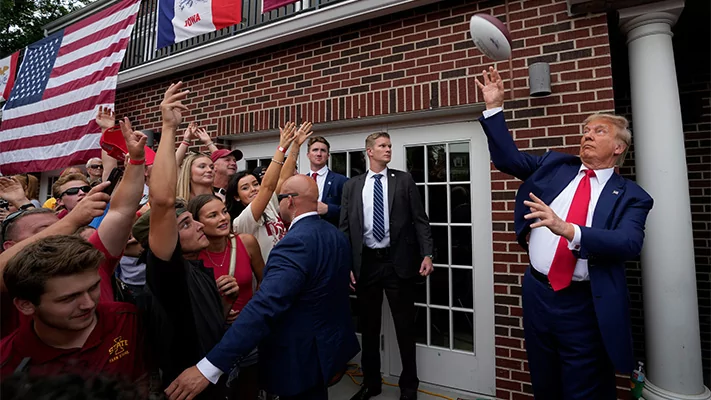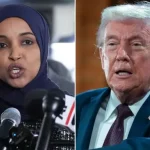
When former presidential candidate Vivek Ramaswamy spoke at the Republican National Convention in Milwaukee, he included a unique appeal to young voters — that the GOP is now the party of free thinkers and counterculture warriors.
“Our message to Gen Z is this: You’re going to be the generation that actually saves this country,” he said on the Fiserv Forum stage, in Wisconsin’s most populous city.
“You want to be a rebel? You want to be a hippie? You want to stick it to the man?” Ramaswamy continued. “Show up on your college campus and try calling yourself a conservative. Say you want to get married, have kids, teach them to believe in God and pledge allegiance to their country.”

Some polling indicates younger voters may be doing just that.
While the 18-34 crowd is expected to remain Democratic-leaning overall, notable shifts have appeared during the 2024 election cycle. A Morning Consult “State of the Parties” poll released during the RNC found a notable shift in perceptions, with young voters saying the Republican Party has changed for the better in recent years while the Democratic Party has changed for the worse.
Specifically, the GOP saw a 14-point gain over 2020 levels when young voters were asked which party would keep the country safe, while Democrats saw a 9-point decline. Republicans saw a 17-point gain among young voters who were asked which party “represents my views,” drawing even with Democrats overall.
The poll was not necessarily an outlier. After Vice President Kamala Harris took over for President Joe Biden atop the Democratic ticket, CNN’s Harry Enten filmed a segment in which he cited data showing Harris’s youth support was down 13 points from where Biden’s was in 2020, along with a 10-point swing toward the GOP among voters under 35.
Is the shift because Republicans are now the party of rebels, hippies, and outspoken free speech types? Anecdotal evidence says it is, or at least that conservative views can get you in trouble on campus.
When a Young America’s Foundation chapter in California placed anti-communism posters at Clovis Community College in 2021, administrators ordered the posters removed and denied permission to post new ones. The students then sued the college president and other officials, and after a lengthy battle, they won a $330,000 settlement that barred the school from censoring “offensive” speech.
“Just one student standing up can make all the difference in the fight for our First Amendment rights,” Alejandro Flores, the chairman of the chapter, said after the victory.
While it has become conventional wisdom that younger voters lean left, the axiom is relatively new. Another truism is that young people tend to push back against the views of their parents.
Young people backed Democrats from the days of Franklin D. Roosevelt through Lyndon B. Johnson in the 1960s. But Richard Nixon narrowly won the youth vote by 6 points in 1972, Ronald Reagan won them by almost 20 points in 1984, and George H.W. Bush enjoyed a 5-point edge with young voters in 1988.
That 1980s political generation gap made its way into pop culture via the NBC sitcom Family Ties, in which young Republican Alex P. Keaton, played by Michael J. Fox, spars with his liberal, ex-hippie parents.
Show creator Gary David Goldberg said explicitly that the show reflected his reality.
“It really was just an observation of what was going on in my own life with my own friends,” he said. “We were these old kind of radical people, and all of a sudden you’re in the mainstream.”
Craig Shirley was one of those young conservatives who came of age during the Reagan years. Now a presidential historian and Reagan biographer, he said he’s seeing echoes today.
“Young voters have seen high inflation, crime in the streets, unending wars. They don’t like that any more than their elders do,” he said. “I’m not surprised younger people are trending toward the right and trending toward Trump because they’ve seen the failures of liberalism.”
As recently as 2000, George W. Bush nearly tied Al Gore for the youth vote, losing by 2 points with the demographic. But since then, and especially since Barack Obama’s millennial landslide in 2008, Democrats have beaten Republicans by almost 2-to-1 margins among the 18-29 set.
Many politicos are skeptical that the winds are changing, especially with a 78-year-old candidate leading the GOP ticket for the third straight cycle.
“Maybe you’ll see some movement, but not as strong as some surveys have suggested,” said Kyle Kondik, managing editor of Sabato’s Crystal Ball. “And maybe it doesn’t happen at all because Harris seems like a better fit for younger voters than Biden did.”
Harris has certainly energized the Democratic ticket, wiping away former President Donald Trump’s polling lead and bringing huge crowds to her outdoor rallies. Her campaign is burning up the internet with TikTok dances and coconut tree memes, even if it’s light on policy substance so far.
CLICK HERE TO READ MORE FROM THE WASHINGTON EXAMINER
Does that translate into actual votes? A CNBC poll released Aug. 8 indicates it will, finding a 12-point swing toward the Harris ticket among young voters after she replaced Biden.
The problem for Democrats is that voters ages 35-49 had a 12-point swing in the poll — toward Trump. Maybe it isn’t time to fire up the Family Ties reboot just yet.






